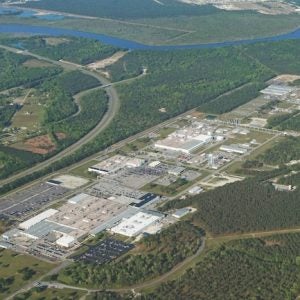
“BECOMING THE WORLD’S FIRST CLIMATE-neutral continent by 2050 is the greatest challenge and opportunity of our times” – these words were used by Ursula von der Leyen, the new President of the European Commission, when she presented the European Green Deal. The Deal, which is a key element of the EU’s current plan, is described as “Europe’s roadmap for green transition that should help it cut emissions, create jobs and open up new opportunities.”
Climate change: the world’s greatest challenge
Climate change is the single greatest challenge the world faces. All projections clearly indicate that if we don’t act urgently, it will soon be too late to stop global warming. Several reports published over the last 18 months, such as the UN’s Intergovernmental Panel on Climate Change (IPCC) report Global Warming of 1.5°C, the International Energy Agency’s (IEA) Nuclear Power in a Clean Energy System or the Massachusetts Institute of Technology’s The Future of Nuclear Energy in a Carbon-Constrained World, say that low-carbon nuclear is an essential component of a carbon-free economy. According to one of the IPCC scenarios, a six-fold increase in global nuclear capacity is needed, if we want to achieve climate goals. The IEA states that, “a range of technologies, including nuclear power, will be needed for clean energy transitions around the world”, and MIT says that, “without the contribution nuclear energy provides as a dispatchable and low-carbon energy source, the overall cost of achieving deep decarbonisation targets will increase significantly”.
The discussion about the importance of decarbonising the economy has been the main topic in the European Union over recent months. The 27 countries that make up the European Union decide together how to address the key challenges it faces — such as climate change.
The importance of nuclear energy in this context has already been recognised by the EU’s executive arm and one of the EU’s main bodies, the European Commission. In its 2050 strategic long-term vision for a prosperous, modern, competitive and climate-neutral economy, published in 2018, it said “nuclear will form the backbone of a carbon- free European power system, together with renewables”.
The European Union is currently working on a European Green Deal — a new growth strategy that aims to transform the EU by 2050 into a prosperous society, with a modern, resource-efficient and competitive economy where there are no net emissions of greenhouse gases. The key question is what role nuclear energy will play under the European Green Deal and all other EU energy-related files that will follow it.
Why does Europe need nuclear energy?
In my view, the answer to this question is clear: nuclear energy can help the EU achieve a sustainable and low-carbon future while at the same time providing people with reliable and affordable electricity. Nuclear emits 30 times less CO2 than gas and 65 times less than coal. The lifecycle CO2 emissions per kWh produced by nuclear reactors are comparable to those of wind and significantly lower than solar. Also, it can help decarbonise other sectors by producing, for example, hydrogen for energy intensive industries or heating for households.
That is why the decarbonisation targets in the transition towards 2050 cannot be achieved without nuclear — both new-build and the long-term operation of existing plants. In fact, if the EU were to invest in maintaining a fully operational nuclear fleet over this period, then 58% of its electricity would come from low-carbon sources by 2030 — making it the global leader on climate change policy. If not, the share will drop to 38%, increasing cumulative emissions by around 1500 million tonnes of CO2 by 2030.
Nuclear is a recognised sustainable source of energy, as it requires less raw material than wind or solar and has a lower land-use footprint which means less of an impact on biodiversity and the natural landscape. In addition, it does not emit any harmful air pollutants. And whilst it does produce radioactive waste, the volumes remain very modest and are handled in a responsible manner.
Apart from its undeniable contribution to counteracting climate change, nuclear energy offers many other important benefits, such as providing security of energy supply at a reasonable cost. Renewable energy sources, such as wind and solar, are one of the tools available which can help Europe decarbonise its electricity system. The challenge which they face today is their intermittent nature, given that they depend on the sun shining and the wind blowing. Hence they have to be combined with other sources of low-carbon energy — such as nuclear, the only large-scale form of electricity production which is not weather- dependent. By combining intermittent renewables with flexible nuclear, Europe will be able to decarbonise its electricity system, whilst at the same time ensuring security of supply.
Finally, nuclear energy provides many economic benefits. The nuclear sector provides long-term skilled jobs, generates more than half a trillion euros in gross domestic product (GDP) and offers substantial export potential. Europe holds technology leadership across all segments of the nuclear value chain, which it develops through R&D and innovation. According to the latest Deloitte study Nuclear Energy: Powering the Economy – Carbon-Free Growth, Jobs and Leadership in Innovation, one GW of installed nuclear capacity in the EU triggers €9.3 billion in annual investment in the nuclear and connected economic sectors. Each GW provides permanent employment to approximately 10,000 people and generates €4.3 billion in GDP.
The European nuclear industry has committed itself to work on delivering the required volume of nuclear capacity on time and at a competitive cost; to undertake more research, development and innovation activities (such as the deployment of SMRs in Europe); to contribute to ensuring security of energy supply; to manage used nuclear fuel and radioactive waste in a responsible manner; and to invest in and maintain human capital.
Latest nuclear-related developments in the EU
Even though it may seem obvious that nuclear energy is essential for the development of the EU — especially taking into account the already mentioned benefits — its future in the EU is far from clear.
There are 109 nuclear reactors operating in EU member states (post Brexit). These reactors generate around a quarter of the electricity in the European Union and almost 50% of its low-carbon electricity. Three nuclear power plants are currently under construction in France, Finland and Slovakia and over 15 reactors are planned to be built in countries such as Bulgaria, the Czech Republic, Finland, Hungary, Poland and Romania.
Regarding each country’s approach towards nuclear, the situation varies. At the moment, we are witnessing a very fragile balance of power between those countries that support nuclear energy and those that are against it. Many countries see nuclear energy as essential to their energy mix (Bulgaria, Czech Republic, Finland, France, Romania, etc.), but others have taken the decision not to have any nuclear or even to phase out their operating nuclear fleet prematurely. In more extreme cases, some countries (Austria in particular) are actively fighting against the use of nuclear power in other Member States, making use of all possible legal and political means.
Nevertheless, at EU level there are signs that nuclear energy will keep its current role. The already-mentioned European Green Deal maintains the principle of leaving EU Member States free to choose their own energy mix. In a resolution ahead of the COP25 conference, the European Parliament recognised the important role of nuclear in fighting climate change. Also, the European Council’s memorandum following the latest summit includes nuclear energy as a tool used by some of its members to achieve climate neutrality, and the Sustainable Finance Taxonomy Regulation does not exclude nuclear.
This trend could be also seen at the end of last year, when several EU Member States (such as the Czech Republic, Hungary and Poland) made it clear that in order to commit to the 2050 decarbonisation targets, they must be allowed to invest in nuclear power.
However, there are also some signals at EU level showing that nuclear will not be treated equally with other low-carbon energy sources. While discussing the bloc’s future energy mix, EU decision makers tend to focus only on renewables and energy efficiency. In addition, the EU is currently working on a funding mechanism which would provide financial support to coal-dependent regions (the so-called Just Transition Fund) in order to assist them in their decarbonisation efforts. The Commission’s latest proposal prevents such funds from being used for nuclear power plants.
How can we help the process?
In order to reinforce nuclear energy’s role at EU level, in June 2019, senior representatives from across the European nuclear industry outlined — in a joint manifesto — what they believe needs to be done in order to achieve a decarbonised Europe by 2050, whilst at the same time maintaining growth and jobs. They called on EU policymakers to work together to overcome the hurdles which have the potential to prevent Europe from achieving its goals. There is a lot to be done by EU decision-makers in this context, as they should agree an ambitious net-zero CO2 emissions target for the EU in 2050, ensure a coherent, consistent and stable EU policy framework, and support a stable low-carbon energy mix which can accommodate the increased share of renewable energy generation. I believe that there is a strong need in the EU for new nuclear capacity. To achieve that, it is essential to implement both a stable investment framework that incentivises investment in all low-carbon energy sources, and a strong industrial strategy to ensure that Europe maintains its technological leadership.
In this context, the European nuclear industry has a lot to offer. Maintaining jobs and growth in the EU is one of Europe’s priorities, and for this it will need to maintain a strong industrial base. Due to increased globalisation, Europe’s industries are facing strong competition from other parts of the world, which is in part due to higher energy costs. Furthermore, many industries are energy intensive. They will need to find stable solutions which can help them decarbonise their manufacturing process, or Europe will run the risk of losing its industries.
Nuclear clearly has a role to play in supporting these industries and helping them to remain in Europe. It can provide a stable supply of the low-carbon electricity which they will need as they electrify their industrial processes.
What’s ahead of us?
The coming year will be decisive. There are many EU legislative proposals (European Green Deal, Sustainable Finance, European Climate Law, etc.) due to be approved. The outcome of this process will either accelerate the development of nuclear energy in Europe or slow it down for good. What is more, some of the legislation mentioned, such as sustainable finance, is supposed, according to the European Commission, to be implemented by international organisations as well. If nuclear energy is excluded, it could have a severe impact on other economies (including the USA).
In my view, the path chosen to fully decarbonise the European economy should embrace all-low carbon energy sources. Renewables alone cannot solve the climate crisis, and betting too much on CO2-emitting gas could have harmful lock-in effects on the climate in the long run — even though many EU decision makers seem to downplay this threat.
According to the aforementioned IPCC report, nuclear power has a key role to play if the world is to keep global warming to below 1.5 degrees.
If the European Union is serious about tackling climate change, then EU decision-makers must act urgently and make use of all the best low-carbon tools available today, including nuclear, which can help the EU achieve its goals. Only by combining renewables with nuclear energy, making up a significant part of Europe’s future energy mix, can we still deliver on our commitments. This is the only pathway for the EU to achieve its strategic goals.
Author information: Yves Desbazeille is Director general, Foratom






